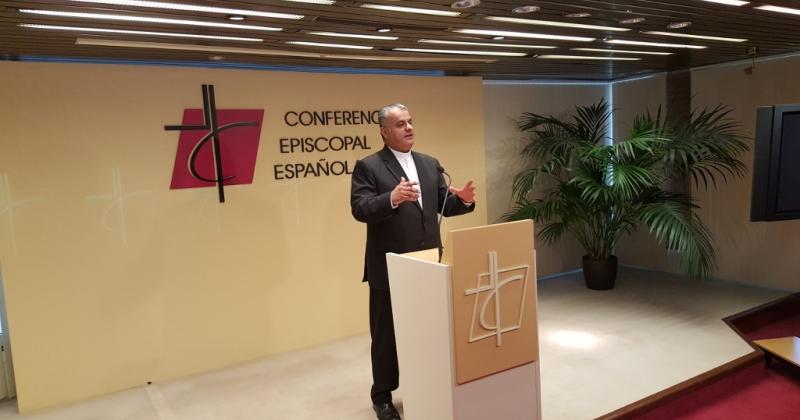Francis’ final meeting for today,January 13, - the first day of his visit to Sri Lanka - was with representatives of religions: “We must be clear and unequivocal in challenging our communities to live fully the tenets of peace and coexistence found in each religion, and to denounce acts of violence when they are committed”.
Francis concluded his first day in Sri Lanka much later than expected, with a meeting at the Bandaranaike Memorial International Conference Hall. His encounter with Maithripala Sirisena – which took place at the Presidential Secretariat instead of the Presidential Palace – went on for longer than expected. Francis was greeted by representatives of the four largest religious communities in the country, which form an integral part of Sri Lanka's life: Buddhism, Hinduism, Islam and Christianity. Francis was greeted by Buddhists with a ritual chant and at the end of his speech, the Hindu religious leader placed an orange coloured cape over the Pope’s shoulders.
Buddhists make up 70% of Sri Lanka’s population, Hindus 12.6 per cent, Muslims 9.7 per cent and Christians (most of them Catholics), 7.4 per cent. The country was bloodied by a civil war that lasted over a quarter of a century. It was fought between the central government and the Tamils who inhabit the northern part of the island. The conflict was motivated by politics more than religion. But when the civil war ended, religious intolerance exploded among extremists who see Sri Lanka’s identity as inextricably linked to Buddhism, discriminating and in some cases committing acts of violence against members of other faiths such as Muslims and Christians, who are seen as “enemies”.
Francis is well aware of the situation. In his speech he first recalled the Catholic Churche’s declaration of “deep and abiding respect for other religions” at the Second Vatican Council, a respect that “rejects nothing of what is true and holy in these religions.” He assured those present that it is in this spirit that the Catholic Church wishes to collaborate in order to ensure Sri Lanka’s well-being.
“As experience has shown,” Francis explained, “for such dialogue and encounter to be effective, it must be grounded in a full and forthright presentation of our respective convictions. Certainly, such dialogue will accentuate how varied our beliefs, traditions and practices are. But if we are honest in presenting our convictions, we will be able to see more clearly what we hold in common. New avenues will be opened for mutual esteem, cooperation and indeed friendship.”
“For too many years,” Francis said, “the men and women of this country have been victims of civil strife and violence. What is needed now is healing and unity, not further conflict and division. Surely the fostering of healing and unity is a noble task which is incumbent upon all who have at heart the good of the nation, and indeed the whole human family.” Once again, Francis pointed to the path of collaboration, of working together to help the needy, as the path for interreligious dialogue: “How many ways there are for the followers of the different religions to carry out this service! How many are the needs that must be tended to with the healing balm of fraternal solidarity! I think in particular of the material and spiritual needs of the poor, the destitute, those who yearn for a word of consolation and hope. Here I think too of the many families who continue to mourn the loss of their loved ones.”
“For the sake of peace,” the Pope concluded, “religious beliefs must never be allowed to be abused in the cause of violence and war. We must be clear and unequivocal in challenging our communities to live fully the tenets of peace and coexistence found in each religion, and to denounce acts of violence when they are committed.” A teaching that is in tune with the words pronounced by Sri Lanka’s Muslim leader, who condemned the Paris attacks in his own address to the Pope.
